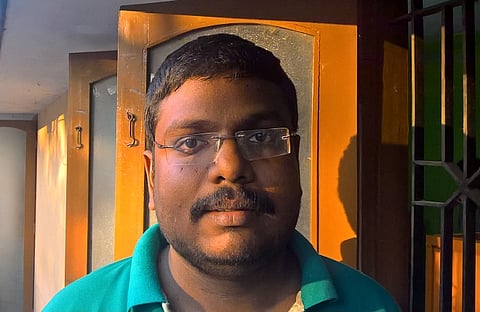

By Biju Parameswaran
Amidst the unending ‘Art for Art’s sake or Art for Life’s sake?’ contestations among the literary cognoscenti, there will be no two opinions on what philosophy underlines the poetry of young poet Chandramohan S.
The Thiruvananthapuram-based poet is an unequivocal believer in the transformational power of literature as evident from his calling himself a Dalit poet. The label might seem constraining at first glance, especially viewed from a purely literary angle. But a closer examination of his writing reveals that it is not: Chandramohan is a writer of not just good but excellent poetry.
In his first collection of poems Warscape Verses, published in May 2014, Chandramohan champions the causes of the subaltern, his voice unmistakably one of existential angst. All writing, the Nobel Laureate Orhan Pamuk once said, is leftist. The very act of literature is subversive. Creation stems from inner turmoil and an innate desire to rearrange the status quo. Chandramohan’s verse is no exception.
He reminds you of another active poet, Meena Kandasamy, who incidentally wrote an adulatory blurb for his book Warscape Verses (published in May 2014), lauding his forthright style as well as his political understanding and insight.
Warscape Verses is a collection of firebrand poems singularly focused on shedding light on what the poet rightfully believes are injustices of history. His sensitive mind asks curious questions that are not necessarily about the burning issues of everyday.
For example, he lets his imagination take wings in a poem on Obama Sr who:
came back to homeland
leaving back a seed in an Anglo-Saxon womb
that sprouted to redeem the audacity of hope
transcending race
The bulk of the poems are in a more critical vein though. Farmer suicides, rape of tribal girls, terrorism, abuse of Mother Nature, exploitation by organized religion and political parties and dowry harassment disturb the poet as much as what he sees as saffron fascism in India under the present regime.
One of the poems pays homage to the slain rationalist Narendra Dhabolkar. Chandramohan seems to be inspired by Dalit poet from Namdeo Dhasal (1949-2014). Dhasal was a firebrand who wrote poems in Marathi about the underbelly of Bombay. He founded Dalit Panthers inspired by the Black Panthers of America who practiced militant self-defense of minority communities against the American government, and fought to establish revolutionary socialism through mass organizing and community based programs.
Chandramohan’s poem ‘The Killing of the Shambukas’ is in the lines of the famous poem ‘Strange fruit’ written by Abel Meerapol to protest the lynching of African Americans in the first half of the twentieth century.
Killing the Shambukas
Jim Crow segregated hostel rooms
Ceiling fans bear a strange fruit,
Blood on books and blood on papers,
A black body swinging in mute silence,
Strange fruit hanging from tridents.
The five-line poem became premonitory when Rohit Vemula, a Dalit student of Hyderabad University took his life in the hostel room protesting against the discrimination practiced by the authorities. A mass protest ensued in the country and still rages on; with the present epicenter of protest moving to Delhi’s reputed Jawaharlal Nehru University. This poem found a place in the placards of protesters there. Not many readers will be aware that Shambuka is a Shudra ascetic whom Rama beheaded for practicing penance that apparently caused harm to a Brahmin’s son. Other sidelined characters of a more obvious kind from the crevices of mythology like Shoorpanakha and Ekalavya provide grist to Chandramohan’s literary mill.
Chandramohan, who is trained as an engineer, reminds one of the roaring eighties: the scholar in Dr. Vara Vara Rao and the engineer in Gaddar; both vociferous poets and sounding boards for the People’s War Group and CPI (ML) respectively in Andhra Pradesh.
The poet also dons the role of Coordinator of P.K. Rosy Foundation. One of the poems is expectedly about the maltreatment meted out to Rosy who was Malayalam cinema’s first ever female lead.
Another notable poem ‘My Ode to the Woman of Breasts’ is on a largely unsung Ezhava girl from Kerala in the early nineteenth century who cut off her breasts to protest against an obnoxious tax system. She killed herself afterwards. Her partner Kandapan jumped into her pyre, providing the only recorded instance of a male sati.
Love in the time of CCTV
“In my rear view mirror is the motherfucking law” –Jay Z -99 problems
(1)
The camera tells us.
Keep your hands where I can see them.
Write your love letter.
(2)
You are under surveillance when chalk scrapes
On the blackboard,
When we walk in straight lines, march in tune
To the drum beats of uniformed discipline
While lip syncing to the national anthem
(3)
You are under surveillance,
You can be the
Island to be submerged
Under constant surveillance
Of the rising sea level.
Bilingual poet and academician K. Satchidanandan is one veteran who has hailed Chandramohan for striving to create an egalitarian and humane order in society through his poems. He is currently working on another anthology titled "Letters to Namdeo Dhasal".
Chandramohan’s poetic sensibility displays a larger humanitarian concern even as he specifically seeks to redress the centuries-long suppression of backward communities, sexual minorities and women in his individual poems.
Wishing all power to Chandramohan’s pen as he continues his journey to become a powerful voice in the Indian literary firmament.
(Biju Parameswaran is a widely traveled engineer who writes articles on books, films and assorted topics).